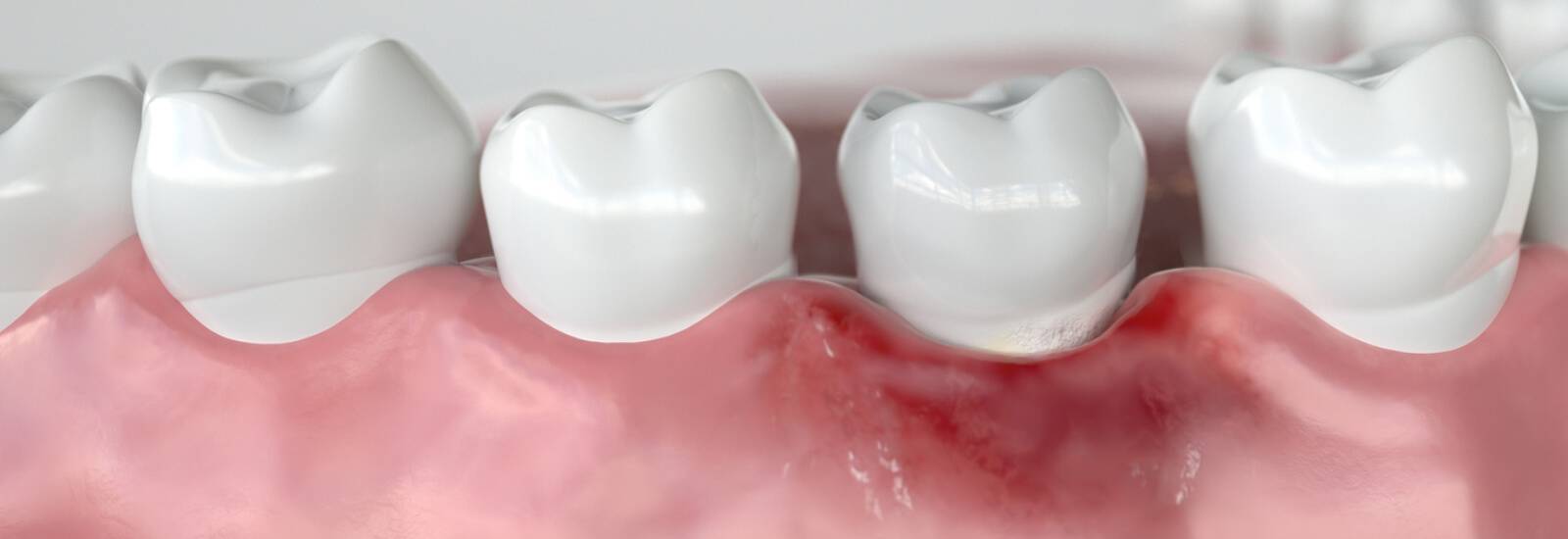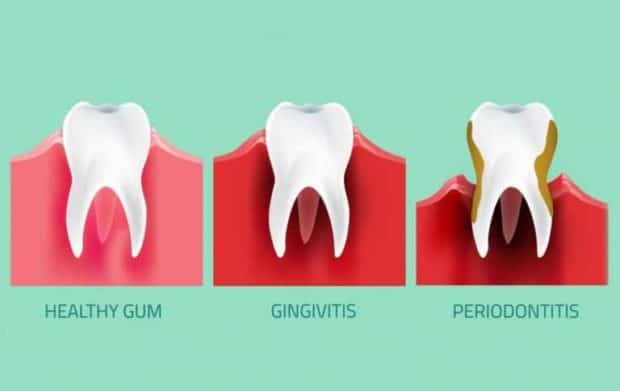Gingivitis
Gingivitis is a gum disease that occurs due to plaque build-up in the teeth. Plaque is a naturally occurring bacterial layer over the teeth, gum and surrounding tissues that results in swelling of the gum. If Gingivitis is left untreated then it may give rise to even more serious gum disease that is popular as periodontitis. In adults, periodontitis can be the primary reason for tooth loss. Usually, gingivitis does not include any pain or discomfort but it exhibits some serious symptoms like redness in gum, puffy gums, bleeding gums. Under such circumstances, it is mandatory to visit a dentist and undergo a dental gingivitis treatment.

Talk to a Dentist Now!
People with mild gingivitis might not even be aware of their condition and may end up ignoring the condition. Even the most chronic gingivitis treatment begins with maintaining good oral hygiene by brushing teeth twice a day and flossing at least once.
In addition to it, the patients are also recommended to use an antiseptic mouthwash that can help to keep the mouth bacteria-free.
What is gingivitis caused by?

The most common cause of Gingivitis is a bacterial build-up in between teeth and gum which initiates an immune response system that is responsible for destroying the teeth and gum. This bacterial build-up may also lead to unnatural tooth loss and even cavity in the tooth.
Plaque is a biofilm layer that occurs due to the colonization of bacteria that sticks to the smooth surface of the tooth.
This natural accumulation of bacteria in teeth can sometimes help in protecting the mouth from the harmful microorganisms but this also results in tooth decay and other chronic gum infections.
If the plaque is not removed properly then there are high chances that it can turn out to form a calculus or tartar layer at the tooth gum junction. The tarter is a yellow colored layer that needs to be removed only under professional supervision. Both plaque and tartar can result in gum irritation, gum inflammation around the teeth root or base.
There are also other causes that may result in the formation of Gingivitis like-
- Change in hormonal level- The hormonal changes in the body occur during puberty, menopause, menstrual cycle and even pregnancy which may result in sensitive and swollen gum.
- Diseases- Serious physical conditions like diabetes or HIV may result in gingivitis.
- Drugs- Some specific oral medications may also result in the formation of Gingivitis, especially in cases of reduced saliva flow. Medicines that are anticonvulsant and anti-angina can also result in abnormal growth of the gum tissues.
- Smoking- One of the most common causes of experiencing gingivitis is smoking that results in the accumulation of bacteria over the smooth layer of the teeth.
- The other common causes of gingivitis are aging, poor diet, deficiency of vitamin C and family history.
Here are some gum disease manifestations to keep an eye out for:
- Red, puffy gums.
- Draining gums, particularly when you brush or floss.
- Sore gums that won’t leave.
- Tooth pain or affectability. At the point when gums pull away from teeth, teeth are increasingly presented and touchy to hot and cold nourishments or drinks.
- Awful breath that won’t leave. Plaque contains a large number of microscopic organisms that produce noxious waste items.
- Free teeth or changes in the manner your teeth fit when you clench down. This could be a propelled gum ailment, called periodontitis.
Gingivitis treatment will procure all the signs and symptoms of the gums by seeing a dentist.
How is gingivitis diagnosed?
Whenever the first symptom of Gingivitis arises, it is important to consult with your dentist who can provide you the best guidance. The exact gingivitis causes and treatment procedure can only be assessed by an experienced dentist in the following ways-
- Reviewing the patient’s dental and medical history
- The visible symptoms
- Evaluating the condition of the teeth, gums, mouth and even the tongue
- The dental groove depth in the gums and teeth is measured with the help of a dental probe. In general, if the dental groove is between one to three millimeters then the patient has a healthy gum, but if the groove is deeper than 4mm then that indicates some gum diseases.
- Dentists may also perform a dental x-ray to check the condition of the underlying bone and find out the presence of deeper pockets.
- If the dentist is not really sure about the exact cause of gingivitis, then they may also ask the patients to undergo other medical evaluation procedures.
Types of Gingivitis
The best treatment for gingivitis can only be provided by the surgeon only after analyzing the severity of the condition and the type of gingivitis that the patient is suffering from. Following are the most common types of gingival diseases-
- Dental plaque-induced gingival disease- Here gingivitis occurs due to plaque formation, systematic factors, side effects for oral medications and even malnutrition.
- Non-plaque induced gingival lesions- This condition is mostly due to the presence of specific bacteria, virus or even fungus. This may occur due to various factors like inheritances, allergic reaction, illness, wounds or even reaction to foreign particles in the body such as dentures.
How do you fix gingivitis?

If gingivitis is treated at the early stages then there are chances that the symptom can be reversed and the colonization of bacteria over the smooth surface of the teeth can be prevented.
Patients undergoing dental gingivitis treatment can prevent serious gum diseases and avoid unexpected tooth loss. People after undergoing this treatment procedure must adopt a healthy routine to maintain good oral hygiene. The gingivitis treatment procedure includes-
- Professional dental cleaning- A professional dental cleaning usually includes removing all traces of plaque, tartar, and bacterial biofilm layer through scaling and root planning. The scaling procedure usually removes the calculus or tartar layer from the tooth surface and near the gums. The root planing procedure helps in removing the bacteria and tartar layer by smoothing out the surface of the teeth which can initiate the gum healing procedure. This dental cleaning procedure is mostly performed by using specific instruments like a laser or even an ultrasonic device.
- Dental restoration- People who have undergone a dental crown treatment or a dental bridge treatment may end up with poor oral hygiene as with these dental appliances brushing teeth and removing the plaque layer might be difficult. This may lead to gum irritation, other gum diseases, and even gingivitis. In such cases, it is important to consult with your surgeon and undergo a suitable treatment procedure.
- Ongoing care- Even the chronic gingivitis treatment includes cleaning up of the plaque layer from the smooth surface of the teeth. Now the obtained result can persist as long as the patients can follow a healthy oral regime. It is only an experienced dentist who can help patients to decide the appropriate treatment only after evaluating the condition. Patients are advised to be under a scheduled check-up and dental cleaning to prevent further gingivitis symptoms.
- Care at home- After undergoing the procedure, patients are advised to brush their teeth twice a day daily not with any ordinary brush, but with an electric toothbrush. Flossing the teeth at least once a day is mandatory to remove the plaque layer from the teeth and then the mouth is to be washed thoroughly with an antiseptic mouthwash.
What can happen if gingivitis is not treated?
The treatment for gingivitis usually includes no complications as that is a safe procedure and involves removing the plaque or tartar layer from the surface of the tooth. However, if gingivitis is left untreated then it will not only result in periodontitis harming the underlying tissues and bones.
How can Sabka Dentist help?
Sabka Dentist is the finest dental clinic that has its branches in more than 5 cities in India. The main motive of the clinic is to offer the best treatment procedure to maximum people at a very reasonable rate. The dental surgeons here are handpicked selectively and each of them holds more than 3 to 4 years of experience.
There are approximately more than 500 dentists present in the clinic who are dedicated to providing their patients with the best treatment plan only after analyzing the condition. The dental surgeons here keep themselves updated with the latest technologies by attending several conferences.
Sabka Dentist is located in the most accessible areas in all these cities that make it easy for the patients to visit the clinic whenever required. Patients usually feel very comfortable and safe in this clinic because the dental surgeons and staff present here maintain a safe and hygienic ambiance.
The best thing is the clinic provides flexible payment options to patients like zero percent EMI, payment through Bajaj Finserv card and a lot of other payment options.
Sabka Dentist aims in providing customized treatment to each patient by using high-standard quality and painless instrument. The staff work hard because they believe in providing an authentic judgment-free environment for the patients.
This clinic has treated over one lakh patients over a year that has presented the dentist with vast collective experience and expertise on dental treatment procedures.
The clinic’s aim is to provide the best dental treatment experience to the patients so that they can walk out with a smile on their face. Sabka Dentist prefers providing the best opportunities to its employees that lead to uninterrupted growth.
Frequently Asked Question
How to get rid of gingivitis?
- Brush Your Teeth Twice a Day with a fluoride mouthwash.
- Floss Your Teeth Once a Day. Plaque loves to hide in between teeth where toothbrush bristles can’t reach.
- Avoid spicy food and beverages.
- Avoid smoking and drinking alcohol.
- Use a Fluoride Mouth Rinse.
- Visit your dentist twice a year for regular checkups.
How long does gingivitis take to heal?
Gingivitis takes 10 to 14 days to heal by itself. If your gingivitis is more serious, it could take longer to treat. Take charge of your dental health to prevent it from recurring.
References
About Author

With extensive knowledge in dentistry, Dr. Manan Dhulia has experience over 9 years as a dentist. He has played varied roles in the Dental industry and keen a great interest in Implantology. Dr. Manan Dhulia is an expertise in Clinical Operations, Business development, and team management. With a brilliant personality, he drives the process flow, ground-level operations, and performance metrics for all units at Sabka Dentist.



